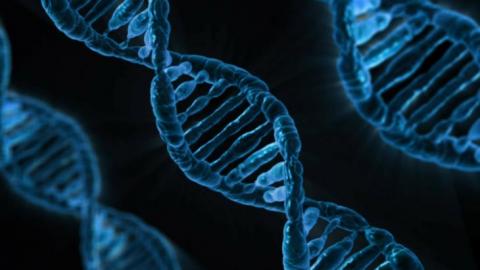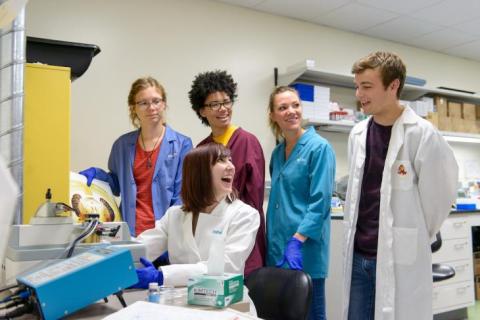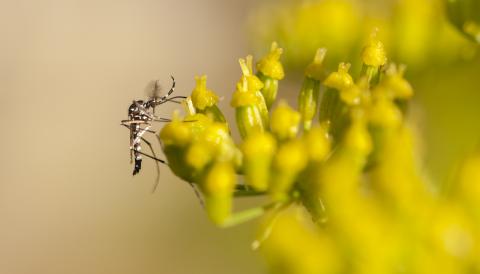ASU evolutionary medicine featured on national stage at world’s largest general scientific meeting
ASU evolutionary medicine featured on national stage at world’s largest general scientific meeting

Coinciding with Charles Darwin’s birthday weekend, ASU’s evolutionary medicine leadership was prominently showcased at the world’s largest general scientific meeting, the 2016 American Association for the Advancement of Science’s (AAAS) annual gathering, held February 11-15 in Washington DC.
“Evolution can explain not only things in the body that work well, but also things that leave it vulnerable for disease,” said Randolph Nesse, MD, director of ASU’s Center for Evolution & Medicine. Nesse gave a general overview of evolutionary medicine, and has been a principle advocate of incorporating evolutionary biology into the medical school curriculum. He introduced a new website (EvMedEd.org) developed at ASU with comprehensive access to educational resources for the field.
“It’s time for medicine to embrace the 20th century and catch up with evolutionary biology,” said Nesse. “There is nothing radical or alternative about evolutionary medicine, it is nothing more or less than the basic science of evolutionary biology applied to the practical science of medicine. And progress is coming fast.”
Nesse and conference co-chair, Case Western University professor Cynthia Beall, held a wide-spanning, interdisciplinary session that demonstrated the far-reaching impacts of evolutionary biology in solving intractable problems in medicine and public health. “What unites all of these talks is asking why?” said Beall. “Each speaker is asking why human biology is this way.”
The sessions featured:
- ASU’s Katie Hinde, PhD, exploring new insights into the key ingredients that give breast milk its “liquid gold” qualities;
- Andrea Graham, PhD, of Princeton University, asking why the immune system can harm people, as people “become too clean, we may be more susceptible to immune-mediated diseases”;
- University of California San Diego’s Pascal Gagneux, PhD. giving a glimpse of the future of human reproduction and possible adverse effects associated with the explosive growth of assistive reproductive technologies, with more than 5 million births in the past 40 years. “We’ve become totally dependent upon our culture of technology for survival, and are in the process of doing the same for human reproduction,” said Pascal;
- University College London’s Mervyn Singer, MD, an intensive care physician, looking at the rise of chronic diseases and critical illnesses as a result of our overuse of antibiotics and “one size fits all” approach to drug intervention;
- Robert Gatenby, PhD, of the H. Lee Moffitt Cancer Center and Research Institute, who sees current cancer treatment as “evolutionarily ill-advised,” and provided a window into a new state-of-the-art “adaptive chemotherapy” approach and early success in the first clinical trial of prostate cancer patients;
- University of Oklahoma’s Christine Warriner, PhD, giving new clues into the microbes that colonized ancient humans by exploring those found in fossilized tooth plaque.
For ASU’s Katie Hinde, the AAAS event was a premiere opportunity to highlight her work on teasing out the benefits of a mother’s milk. “The first 1,000 days are critical to promote life-long health,” said Hinde, who was recruited recently from Harvard to join Nesse’s center.
“Mother’s milk is described as liquid gold. However, despite its importance, the research into decoding the benefit of breast milk is lacking. Dairy scientists know more about milk from cows than we know about mother’s milk.”
Hinde leads the Comparative Lactation Lab at ASU. She hopes to link her findings to confront global challenges such as childhood obesity, and infant deaths due to diarrheal diseases. To improve the delivery of the food, medicine, and signal of milk provided to premature babies, “we need to work backwards from what we know are critical components in milk, to helping babies thrive in the neonatal intensive care unit,” said Hinde. “Treating all milk the same is not evidenced-based medicine.”
The panelists demonstrated how medicine, when viewed through the lens of evolutionary biology, gave entirely new insights and fresh approaches to critical conditions such as cancer, sepsis, obesity, infant health, and the delicate balance between health and disease from our co-existence and co-evolution with millions of bacteria harbored inside human body.
In response to a question, Dr. Nesse said, “Many people have the misconception that evolutionary medicine implies the body is perfect, but it actually implies the opposite. Every speaker today highlighted the trade-offs involved in every trait, and how everything is inherently imperfect,” said Nesse.
Joseph Caspermeyer
Managing Editor, The Biodesign Institute, Communication and Marketing
(480)727-0369


